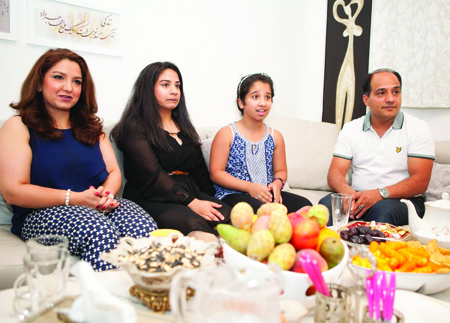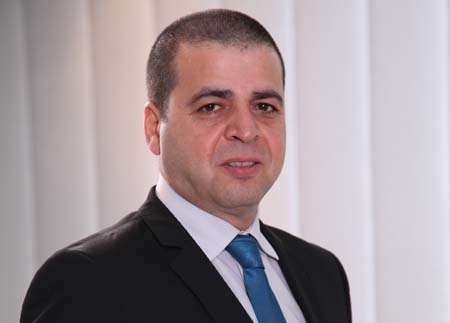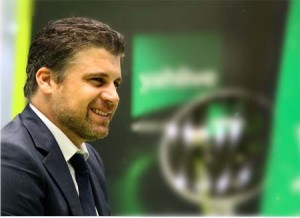A UK-based Farsi-language broadcaster has created the Farsi version of international reality TV show Gogglebox.
 A UK-based Farsi-language broadcaster has created the Farsi version of international reality TV show Gogglebox. In an exclusive interview with BroadcastPro ME, Marjan TV Networks Operations Director shares how it has produced this reality show with a cloud-based post-production solution
A UK-based Farsi-language broadcaster has created the Farsi version of international reality TV show Gogglebox. In an exclusive interview with BroadcastPro ME, Marjan TV Networks Operations Director shares how it has produced this reality show with a cloud-based post-production solution
Gogglebox, a multi-award-winning global TV series, has a Farsi version now. Producing this version involved working with a worldwide workflow in the cloud.
For the uninitiated, Gogglebox features families and groups of friends watching and reacting to television shows from inside their own homes. Although the Gogglebox viewer is essentially watching other people watch TV, the show has enjoyed enormous success because it focuses on the personalities and relationships of its stars creating a number of celebrities in the process.
The series was first broadcast in the UK in 2013 and has since been recreated all over the world, including Australia, the US, China, Ukraine, Germany and South Africa. Based on the shows global appeal and the success of formats like Come Dine with Me and Dont Forget the Lyrics, Marjan Television Network purchased the rights to create Bebin TV, the Farsi version of Gogglebox, earlier this year.
Bebin TV, in Farsi, means to watch TV. The first season of Bebin TV comprised thirteen one-hour episodes, broadcast from August to October 2016 on Marjan’s general entertainment channel, Manoto.
This channel broadcasts to audiences in the Middle East and Europe. The channel launched in October 2010, and with people tuning in via TV, PC, tablets and mobile devices, it boasts the highest market share among foreign-based Farsi-language satellite TV stations.
Reality TV didnt exist for the Farsi-speaking market until Manoto launched in 2010, says Robert Le Merle, Operations Director at Marjan TV.
Come Dine with Me was the first format we licensed, and it has been a huge hit. The programming team chose the Gogglebox format to reinvigorate the channels reality offering, and it was a great decision. Our audience has never seen diverse Farsi families commenting on current television from that region. TV is a central part of our audiences family life, and Bebin TV gives a voice to the national weekly conversation.
Marjan TV Network has taken a global approach to Bebin TV from the outset, starting with their decision to shoot with expat communities in Canada and the UK.
The Gogglebox format presents an exciting way to showcase the views and opinions of an entire demographic of people. In our case, we wanted to show the views of Farsi speakers located all over the world, explains Alex Battrick, Junior Operations Manager, Manoto.
We started with Canada and the UK, then explored how we could expand to Europe, America or further in future series, to engage more community members everywhere.
Although theyre not shooting in the Middle East, the production team chooses content from the region to be featured in the show. These programmes are sent to locations in Manchester and Toronto for the shoot, which takes place over five days at 20 different locations, generating approximately 120 hours of media per week for each episode.
To make sure that the content featured in the show is still current when it airs, each Bebin TV episode has a seven-day turnaround time, which is tight under any circumstances, says Le Merle.
This challenge is compounded by the fact that, in addition to shooting across two continents, the production team has chosen to use offline editors in both Vancouver and London, with finishing taking place in London before the programme is broadcast. Thats a production workflow that spans four time zones every week!
The operations team knew that the only way this plan would succeed was if they were able to make every minute of their schedule productive which meant devising a workflow with no down-time. They turned to Gogglebox in the UK for ideas, and discovered Forscene, a professional post-production software solution in the cloud, which became a key part of the project.
The software allows video producers to access centralised material from a web browser or app on any device over a standard internet connection, and to collaborate from anywhere in the world using a full range of post-production tools.
It is a unified platform that offers review, logging, editing and publishing entirely in the cloud.
British Gogglebox producer Studio Lambert uses Forscene to search and select clips from rushes while editing is in progress on the observational documentary doubling the efficiency of the editing process. Studio Lambert shoots about 150 hours of material a week and logs the footage live during filming.
As soon as the shoot wraps each night, the footage is driven straight back to the post-production house in central London, where it is ingested onto Avid storage and uploaded to Forscene so that its ready for the edit team to start work the next morning. Edit producers and senior producers use a combination of shoot logs and Forscene to locate the best clips to weave into the show.
Inspired by the British workflow, the Marjan TV team met with the Forscene team in London. Together, they planned the Bebin TV cloud-based post-production solution.
Standard postproduction requires access to localised media, a logistical and time consuming problem, says Battrick.
To save time and allow early access to the media, we chose a cloud-based editing platform. We use virtual servers to upload rushes from both our shoot locations to the Forscene cloud. This media is then accessible to our two editors in London and a third editor in Vancouver.
The editors complete an offline edit in Forscene, while the full resolution media is transferred back to the London-based operations centre via Signiant. Once the edit is complete and the fullres media has been received, we move the edit to Adobe Premier Pro, via XML, for our online edit in London. Finally, we broadcast via satellite back to the Middle East, and globally via web streaming through our channel, Manoto.
Ordinarily, training a post-production team to use an entirely new system might take weeks or even months, but the Bebin TV team was able to get up and running in under two weeks, according to Le Merle.
Were transferring media over IP and satellite, but using a cloud-based editing platform was an obvious next step the key was finding the right one.
It was important to choose a solution that could be implemented easily, and Forscene offered an intuitive interface which everyone quickly got to grips with.
Two training days were held with Marjan TV staff one for admin and super-users and another for editors. The technical team was confidently using the system after just three days of operation, while the editors spent two weeks fully familiarising themselves with the software before production began.
After using the system for two weeks, the Marjan TV and Forscene teams created a customised import workflow for third-party log notes to automatically attach logging metadata to selected media clips, creating even more efficiencies in an already optimised workflow.
Le Merle is impressed with the business benefits of the cloud-based workflows.
The post-production schedule is 24/7, but were not paying for tech support at a post house for all that time. Weve not had to spend any capex budget and Forscene has kept the opex costs low. The team has created a fantastic workflow, with Forescene playing a central role.
Owain Dain, Post-Production Producer at Marjan TV, says the team selected the solution to centralise our editing due to its fast media upload and edit capabilities.
Forscene allows us to start editing immediately after the shoot, enables 24-hour post-production with editors working across different time zones, and provides me with the ability to check in on edits, from anywhere in the world, on my laptop. I believe we wouldnt have been able to pull off this production without it.










































































